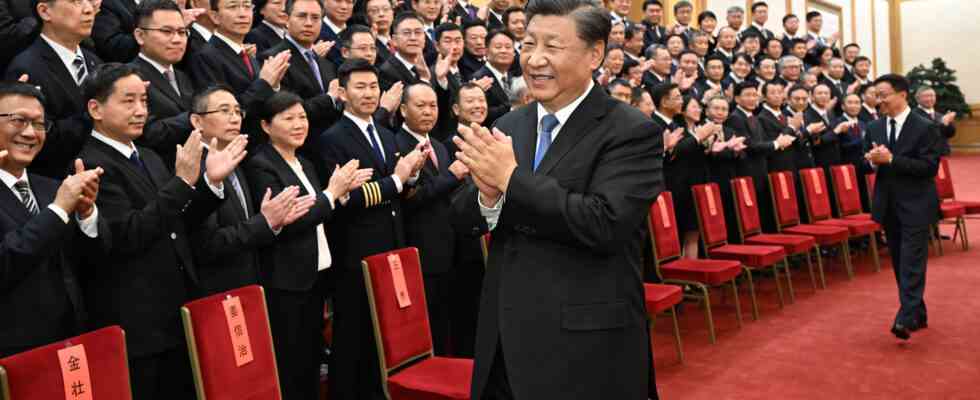world mirror
Status: 16.10.2022 02:00 a.m
The personality cult surrounding China’s head of state Xi is all-encompassing. At the party conference that begins today, he could swear the CP to complete loyalty. Critics warn that ideology is also increasingly determining politics – it is a global danger.
It was a suicide mission, but apparently the desperation was great enough for it: Last Thursday, unknown people attached huge protest signs to an elevated road in busy Beijing. “Strike and remove the dictator and national traitor Xi Jinping!” read the banners. Photos and videos of it made the rounds at breakneck speed. But just a few hours later, nothing more could be found on the strictly censored Chinese Internet.
Even the hashtag “Beijing” or the district name of the incident, “Haidian”, were blocked on the popular platform Weibo. A song called “Sitong Bridge,” the name of the section of the elevated road where the incident is believed to have occurred, has been removed from online music services.
Protest banners like the one on the Sitong Bridge are rarely seen in Beijing anymore.
Image: VIA REUTERS
Long slogans of support for the CP, on the other hand, are part of the picture in Beijing and all cities in China.
Image: AFP
Photos and videos of the protest action can only be found on Twitter and YouTube. Some Chinese also wrote there that their WeChat account was blocked for sharing photos of the demonstration. WeChat is the main communication app, which is also necessary for paying and for the constant PCR tests in the country. A citizen without WeChat can hardly get through everyday life in China.
Comprehensive leader cult around Xi
Anyone who hung up the protest banners will hardly remain undetected for long: Every corner of Beijing is under video surveillance, and according to estimates by the analysis company Comparitech, China’s cities have one camera for every three inhabitants. The expected penalty should be enormous.
Because the timing of the protest action is very inconvenient for the one-party state: The party congress of the Chinese Communist Party, which takes place every five years, begins today – the most important event on the political agenda, because according to the constitution the party has more power than the government.
The party congress is about personnel and the political agenda for the next five years. Xi Jinping wants to be confirmed as Secretary General for another five years. He wants to overturn the successor mechanism at the top of the KP that has been in place for decades.
He is already concentrating more power on himself than any Chinese leader since Mao. He is head of state, party and military. Even school children have to read his texts. His thoughts on China have constitutional status. The pictures on television show: pure leadership cult.
Xi Jinping’s China: Nationalism and the Cult of the Leader
Tamara Anthony, ARD Beijing, Weltspiegel, October 16, 2022
China’s economy is weakening
But Xi’s position is becoming more difficult: internationally, China is facing increasing headwinds, and domestic economic growth is falling. Unemployment among young people reaches record levels, many migrant workers have to save on food, and a real estate crisis shakes the country.
“People are becoming more cautious, consumption is relatively meager, there is even a leveling off in some areas,” explains Jörg Wuttke. He has lived in China for four decades and is currently President of the European Chamber of Commerce. Chinese optimism drove the economy for more than 30 years, says Wuttke. “There was always the belief: Tomorrow will be better than yesterday. But I think that this belief is waning.”
China’s growth brought legitimacy to the Chinese leadership. Many describe it as a social contract between state and society: You are getting better and better, but we are curtailing your freedom rights. But how can the party secure its support when the economy is weakening?
The writer Murong Xuecun left China before the publication of his latest work – for fear of repression.
Image: AFP
Ideological instead of pragmatic politics
Political writer Murong Xuecun says Xi has already abandoned the discourse on “reform and opening-up.” China’s economy is increasingly decoupled from the principles of the free market. “Xi Jinping has taken to using nationalist discourses such as ‘national resurgence,'” says Murong. Before the publication of his latest book, he left China for fear of repression.
“For a long time, economic growth was the state maxim, but recently ideology has won,” says Wuttke, President of the Chamber of Commerce. The zero-Covid policy, for example, is ideologically motivated. Foreign mRNA vaccines are not approved in China. As the world opens up after the pandemic, China’s borders remain tight – even at the expense of the economy. The country seals itself off, foreign countries are demonized.
However, Murong does not believe that Xi wants to base himself exclusively on nationalism. “I think his power now is based mostly on controlling people and scaring them.”
“Difficult for Xi to listen to others”
Many experts assume that Xi will gather more loyal followers at the party congress. While different opinions at the top of the party were tolerated as “collective leadership” for a long time, this could now be the end of it. “I think Xi is like Mao at his age or like other dictators like Kim Jong Un and Putin. It’s difficult for him to listen to others,” Murong said.
Therein lies the danger. There is a lack of access to reality and arguments, says Murong: “Everyone around him will only say what he wants to hear. If Xi wants to start a war, everyone around him will only give reasons why he will win a war .”
A stronger Xi poses dangers for the entire world, says the publicist. In the worst case, the party congress would also have an impact as far as Europe.
You can see this and other reports on Sunday, October 16th, 2022 at 6.30 p.m. in the “Weltspiegel”.

